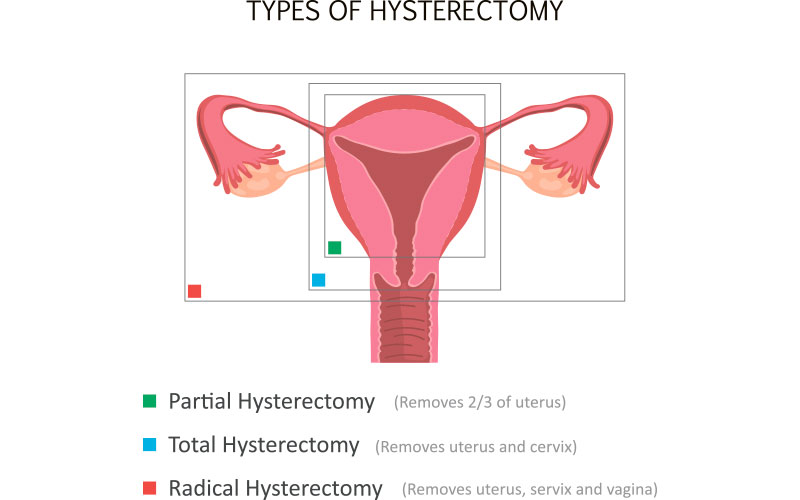- Home
- Growth Hormone
- Growth Hormone
- Growth Hormone Deficiency
- Growth Hormone Therapy
- Growth Hormone Injections
get startedThe Most Effective Hormone Replacement TherapiesHormone Replacement Therapy After Hysterectomy

Hormone replacement surgery can be beneficial to most women after having a hysterectomy.
Hysterectomy is one of the most common surgical procedures performed on female patients. Doctors perform an average of 500,000 hysterectomies a year in the US.
A hysterectomy can be “partial,” “total,” or “radical,” depending on what structures are removed. Most hysterectomies involve the surgical removal of the ovaries or “oophorectomy.” While often necessary during hysterectomy, removal of the ovaries invariably results in a significant decrease in estrogen production, creating a condition that doctors refer to as "surgical menopause.”
In many cases, hormone replacement therapy after hysterectomy is an effective way to counteract the supply of estrogen women lose from the procedure.
What Is Surgical Menopause?
A complete hysterectomy, including oophorectomy, has significant hormonal implications. Regardless of a woman’s age, if her ovaries are removed during a hysterectomy, it creates a condition known as "surgical menopause." Since the ovaries are the primary producers of estrogen in a woman’s body, removal of the ovaries in premenopausal women will result in what doctors refer to as "surgical menopause.”
Surgical menopause can put women through the same kind of debilitating symptoms as the loss of estrogen that occurs during natural menopause.
When a woman reaches her last menstrual period, usually around the age of 50, she can start feeling the well-known symptoms of menopause – mood swings, night sweats, hot flashes, etc. These uncomfortable symptoms are a reaction to a gradual loss of estrogen before, during, and after menopause.
After removal of the ovaries during a hysterectomy, estrogen levels plummet all at once. That sudden drop in estrogen can make the symptoms of surgical menopause much more severe than during natural menopause.
When it comes to treating the symptoms of natural menopause, hormone replacement therapy can be subject to individual choice. Some women with mild symptoms of natural menopause may choose to forgo hormone replacement and "grin and bear it." Others choose hormone replacement therapy(HRT).
However, most physicians agree HRT after hysterectomy is not a matter of choice and recommend HRT for all women experiencing surgical menopause after a hysterectomy. This is especially true for women who have had to have a hysterectomy and oophorectomy at a relatively young age.
Options for Hormone Therapy in Women Who Have Had a Hysterectomy
If your hysterectomy is such that it includes oophorectomy, there is no doubt that — surgical menopause will occur. In this case, estrogen replacement is almost always recommended. A 2007 study discussing the decision to have HRT after hysterectomy concluded, “When a bilateral oophorectomy is performed before natural menopause, the onset of menopausal symptoms, primarily vasomotor symptoms, genital tract atrophy, and/or a decline in sexual function, is rapid, and the symptoms are more severe. Thus, the need for a decision on the use of hormone therapy is accelerated.”
Severe surgical menopause will not occur after a partial hysterectomy that does not involve the removal of the ovaries. Still, in such cases, hormone replacement therapy may be suggested.
Ovaries produce hormones — primarily estrogen and progesterone — that control menstrual cycles and menopause. In the type of hysterectomy that removes a woman’s uterus but leaves her ovaries intact, her ovaries will keep making those hormones – but at a lower level. If you have a hysterectomy that does not include the removal of the ovaries, you may not immediately go into surgical menopause.
However, you could develop hormonal imbalances or go into menopause earlier than usual, which could mean that you could benefit from HRT.
As you can see, therefore, the bottom line on what kind of HRT you need after hysterectomy is based on the type of hysterectomy you have. Your HRT will consist of estrogen and progestin or estrogen alone. Women who have both the uterus and ovaries removed will usually only get estrogen replacement therapy alone. But women who have only the ovaries removed need both estrogen and progestin. That’s because estrogen alone can increase the risk of cancer in the uterus. Adding progestin removes this risk.
Menopausal Symptoms After Hysterectomy
For the most part, the menopausal symptoms a woman will experience after hysterectomy will echo those of natural menopause, although they can be more severe. These include:
- Sudden and more severe onset of menopausal symptoms: in particular; hot flushes, night sweats, and vaginal dryness
- Loss of bone density and increased risk of osteoporosis and fracture
- Impaired sexual function due to reduced desire and discomfort from vaginal dryness
- Reduced sex drive (libido) associated with loss of ovarian testosterone production
- Loss of fertility
- Increased risk of cardiovascular (heart) disease
Benefits of Hormone Replacement Therapy after Hysterectomy
When estrogen levels drop immediately post-hysterectomy, a woman’s hormonal balance is thrown into total confusion. She can experience the sudden and severe onset of menopausal symptoms such as:
- Fatigue
- Lack of sex drive
- Hot flashes
- Night sweats
- Mood swings
- Painful intercourse and vaginal dryness
- Joint pain
- Impaired memory, lack of focus, and other cognitive difficulties
- Weakened immune function
- Weight gain
- Increases anxiety and depression
Post-surgical hormone replacement therapy can reduce or even eliminate most, if not all, of these symptoms.
As in women taking HRT for natural menopause, there can be additional benefits for women undergoing hormone replacement for surgical menopause. HRT may also reduce the risk of diabetes, heart disease, and osteoporosis.
Risks of Hormone Replacement Therapy after a Hysterectomy
For almost all women, the benefits of hormone replacement after hysterectomy far outweigh the risks. Whether being used after hysterectomy or properly prescribed by your doctor for any other reason, hormone replacement therapy is generally regarded as safe and effective. However, HRT, like any drug or medical procedure, has some risks. Some of the potential side effects of hormone replacement after a hysterectomy include:
- Breast tenderness
- Bloating
- Upset stomach
- Swelling in other parts of the body
- Leg cramps
- Headaches
- Indigestion
- Vaginal bleeding
In addition, hormone replacement therapy may increase the risk of health problems in a small number of women. This increase in risk depends on your age, past medical condition, and family history. Talk with your doctor about these risks. HRT post-hysterectomy may increase your risk of:
- Stroke.
- Blood clots.
- Gallstones.
You should probably not have HRT:
- You have unexplained vaginal bleeding.
- You have liver disease or other problems with your liver.
- You have breast cancer, ovarian cancer, uterine cancer, or blood clots, or have had a stroke.
What Happens if You Don’t Have HRT After a Hysterectomy?
Estrogen plays a key role throughout the body. It affects the brain, the bones, the skin, the heart, blood vessels, and more. While estrogen levels gradually drop during natural menopause, they plummet drastically after hysterectomy that results in surgical menopause. That sudden drop in estrogen can lead to menopausal symptoms that can be quite severe.
Women who are in their 20s, 30s, or 40s will experience all of the symptoms of menopause earlier than they should if they do not have HRT after a hysterectomy. Early menopause can cause hot flashes, night sweats, mental fog, sexual health issues, and other symptoms typical of natural menopause. Hormone replacement therapy will eliminate these kinds of symptoms or makes them less severe if they do occur. HRT also helps with other early menopause symptoms, such as mood swings and sleep problems.
Among other potential negative consequences, if you do not have hormone replacement therapy after hysterectomy, you are at risk for weak bones later in life, which can lead to osteoporosis.
Now that you know a little bit more about how hormone therapy can be helpful after hysterectomy, why not contact us today and learn more about the safety and efficacy of hormone replacement therapy.
- Growth Hormone Therapy


























